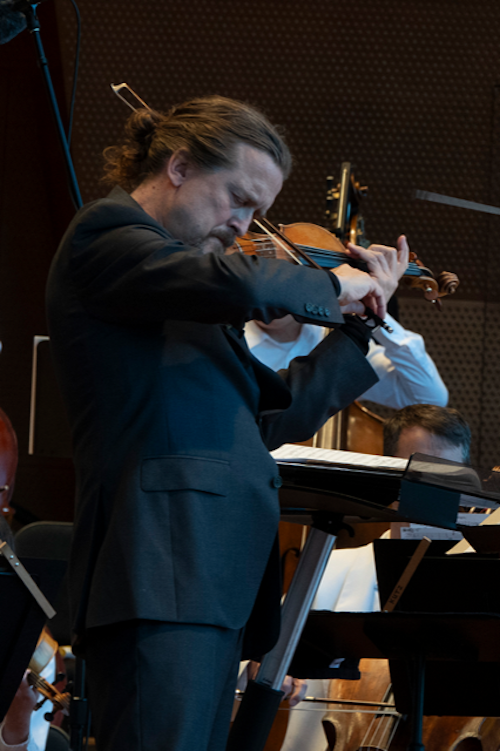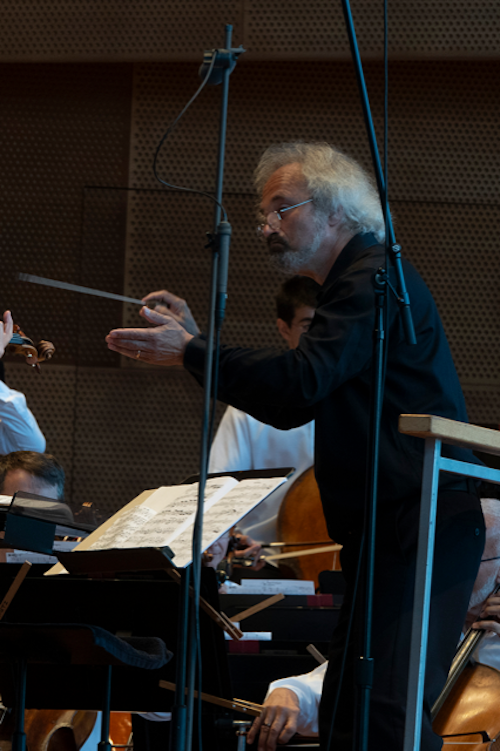Rarities by Elgar and Holst soar at Grant Park Music Festival

The Grant Park Music Festival hit cruising speed Friday night at Millennium Park by doing what it does best—presenting first-class performances of two neglected works, one so obscure that it is unknown even to aficionados.
Edward Elgar’s Violin Concerto led off the program of English composers. Dedicated to Fritz Kreisler and premiered in 1910 with the celebrated violinist as soloist and the composer conducting, Elgar’s Op. 61 would be the last great success of his career. Ironically, the work is infrequently performed now—this side of the pond, at least—and Elgar’s Cello Concerto, which was unenthusiastically received nine years later, is now the much more popular of his two concertos.
The Violin Concerto is cast in the traditional three movements but set on a vast scale, running up to 55 minutes in concert. The concerto’s length and its fearsome demands on the soloist—technically and interpretively—largely account for its neglect. Yet Elgar’s Violin Concerto is one of his finest and most characteristic works, masterfully scored and mixing bursts of blazing solo virtuosity with touching lyrical introspection.
Christian Tetzlaff has been a regular and consistently inspired guest at the lakefront festival for many years and so he proved again Friday night. One wouldn’t necessarily think of Tetzlaff as a natural Elgarian, but the German violinist showed himself wholly in synch with the elusive style of this work.
In addition to handling the daunting technical demands with ease, from his first entrance the violinist brought out an essential fantasy quality, For all its frenetic activity, much of this music is lyrical and intimate; in the melting secondary theme of the opening movement, Tetzlaff shaded his tone down to the barest strand of violin sound—daringly so for this noisy al fresco setting—with the melody’s reprise hovering on the edge of audibility.
Tetzlaff consistently conveyed the nostalgia and romantic melancholy that is at the heart of this work. He admirably kept concentration in the Andante when screaming sirens threatened the hushed reverie of his delicate playing. At the close of the slow movement—and indeed throughout—the violinist brought great freedom to his phrasing, exploring Elgar’s long solo lines without crossing over into indulgence or schmaltz.
In the epic finale, Tetzlaff skillfully assayed the mercurial shifts, balancing the bravura with nostalgic look-backs. In the closing cadenza—with “thrummed” string accompaniment—the violinist sensitively captured Elgar’s searching introspection before the final burst of assertive fireworks—as if the composer were exorcising a past romantic obsession from his mind and moving on with confidence.
Tetzlaff’s probing and insightful solo performance was aided immensely by the collaboration of the Grant Park Orchestra. Kalmar is a master Elgarian—as seen in past festival performances of Elgar symphonies—and here again he judged the composer’s restless emotional shifts and lyrical nuances with idiomatic skill. The only lapse was technical—a slight muting of the amplification that prevented the orchestra from emerging with the volume and sonic impact the music requires.
Even after playing a long and demanding work like the Elgar concerto, Tetzlaff generously favored the audience with an encore—the Andante from Bach’s Violin Sonata No. 2 in A minor, played with elegant feeling and focus despite the bevy of sirens, thumps, and assorted noises.
Tetzlaff and his young son joined the pavilion audience for the concert’s second half and the evening’s real curio, Gustav Holst’s The Cloud Messenger in its belated Chicago premiere.

An underrehearsed disaster at its 1913 debut, Holst’s choral work was quickly forgotten by the composer with the ensuing international success of his The Planets. Even Holst’s greatest advocate, his conductor daughter Imogen, harshly criticized the piece. It is rarely revived, even in England, and remains unpublished. In his introduction, Kalmar said that the orchestra and choral parts had to be copied by hand for the evening’s performance.
As with many of Holst’s early works, The Cloud Messenger was inspired by Eastern sources, in this case a mystical Hindu setting of a poem by Kalidasa. The simple, fanciful tale tells of a poet who is separated from his wife and travels on a cloud to the Himalayas, passing over the Ganges River and the temple at Kailasa to personally bring a message of his undying love.
While it is an intriguing discovery and proved a compelling listen, I’m not convinced that Holst’s work for chorus and orchestra is a lost masterpiece. The music is a bit unvaried for its 43-minute length and the cardboard text—Holst’s own translation from the Sanskrit—is fusty and repetitive, with one too many iterations of “Tarry not, O Cloud, tarry not.”
Even so, as shown by Friday night’s full-blooded performance, The Cloud Messenger clearly deserves more than its current state of total neglect. There are passages of remarkable beauty and some glorious writing for chorus in its five continuous sections—not least the radiant music in the finale and the peaceful solace of the coda.
Kalmar is often at his best when acting as an advocate for neglected music, and such was the case in this strongly projected, acutely focused performance. Despite the distraction of brass music intermittently bleeding through from Michigan Avenue—Kalmar led a concentrated and cohesive performance that unfolded in a single arc with powerful playing from the orchestra across all sections.
Holst’s profligate use of a soloist for one brief section is bizarre but Lauren Decker—a rare true contralto—brought low refulgent tone and eloquent expression to her central aria.
In its first appearance of the summer, the Grant Park Chorus was first-class across the board. Scrupulously prepared by chorus director Christopher Bell, the ensemble vocalism was rich and full-bodied in the heaven-storming sequences and the singers floated the text with supple tenderness in the closing pages.
The program will be repeated 7:30 p.m. Saturday. gpmf.org
Posted in Performances

